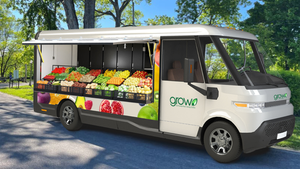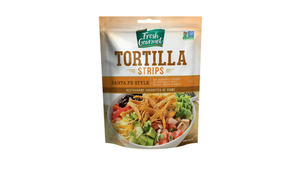NEW HORIZONS FOR BYERLY'S
EDINA, Minn. -- Byerly's here is gearing up for a new phase of growth after being in a holding pattern for a number of years.The company already has carved out a unique place inthe industry with its upscale format. It has become known for gourmet groceries, cakes prepared by European pastry chefs, specialty seafood programs, homemade soups, fancy decor, carpeting on floors, unusual offerings ranging
August 21, 1995
ELLIOT ZWIEBACH
EDINA, Minn. -- Byerly's here is gearing up for a new phase of growth after being in a holding pattern for a number of years.
The company already has carved out a unique place in
the industry with its upscale format. It has become known for gourmet groceries, cakes prepared by European pastry chefs, specialty seafood programs, homemade soups, fancy decor, carpeting on floors, unusual offerings ranging from gift shops to cooking schools, and exceptional service.
But Byerly's has held to its model as others in its market launched programs for time-pressed consumers, particularly expanded food service and "grab and go" offerings. Byerly's also didn't extend beyond its core market or even plan aggressive growth within its region, even as competitors charted impressive unit growth plans.
Now Byerly's is ready to go on the offensive. It will adapt its upscale format to changing consumer needs as it moves away from some aspects of its long-standing model. It also will extend its reach from its Twin Cities base 400 miles east to Chicago in the first of a series of moves that ultimately could see it in a third Midwestern metropolis.
Jack Morrison, chairman of the 10-unit operation, told SN, "We've done pretty well protecting what we have, but we haven't always been willing to do things differently or explore new ideas.
"I think we've maintained the same level of quality Don Byerly [the founder] established in his first store 28 years ago, but everyone else has moved up in quality during that time, and we've got to figure out what it will take in the 21st century to get the same impact Byerly's had at the beginning."
Accordingly, the company has charted a plan whose specifics include: · Becoming more proactive in adapting to changes in consumer preferences, particularly in food service, where Byerly's is launching new programs and experimenting with new food concepts.
· Entering the Chicago market with two stores in 1996, possibly three more in 1997 and perhaps another five in the following three years.
· Pinpointing a third Midwestern city for possible expansion before the end of the century.
· Opening a new store in the St. Paul area in the fall of 1996 and seeking additional expansion sites within the Twin Cities area after several years of virtually no growth here.
Byerly's operates 10 Minnesota stores of 60,000 to 80,000 square feet that will collectively do about $250 million in sales this year, Morrison said. The company is owned by management and Goldner, Hawn, Johnson & Morrison, a Minneapolis-based investment company. Its board of directors includes founder Don Byerly.
The stores offer products and services designed "to exceed customer expectations," according to one of the company's founding principles. Each store is autonomous, and each department manager is responsible for his own purchasing and merchandising.
Despite opening only one new store in the past seven years -- while competitors opened 17 new supermarkets in the Twin Cities area over the last four years -- Byerly's sales have grown 2% to 4% a year, Morrison said. Local observers put Byerly's Twin Cities market share at about 10%, far behind Cub Foods and Rainbow Foods, two operators who each control a 30% share with 19 and 28 stores, respectively.
Four of Byerly's 10 stores average weekly sales of $750,000 a week, or $30 million a year -- a level Morrison said he believes the two Chicago-area stores can reach within a year or two after they open.
"With a store of 70,000 square feet that's doing $30 million to $40 million annually, we think we can do well with only a handful of stores in the Chicago market," he told SN.
"We see the Chicago suburbs as demographically and economically similar to the markets in which we already do well," Morrison said. "And while we have a lot of respect for the competition there, we're going into Chicago with our eyes open.
"It's going to be tough, but there's no one quite like us there, and we think there's room for us in Chicago."
He declined to discuss the outlook for profitability in Chicago, but said Byerly's stores "typically run gross margins several points higher than the industry average of 26% because perishables account for a larger portion of sales.
"So we believe the profitability of each store is usually good enough that we can be comfortable with only two stores [to begin with] in the market -- we don't need a cluster of 10 or more to make money."
The first two Chicago stores will be in suburban locations: Highland Park, north of Chicago, and Schaumburg, northwest of the city. The two sites are about 20 miles apart.
The move to Chicago has been a long time in coming.
"We wanted our first Chicago store to be a gangbusters signature store," Morrison explained, "and we were unwilling to compromise our real-estate standards. So we spent a long time looking for the perfect site."
Ironically, just as it settled on the Highland Park location, the Schaumburg site also became available. While Byerly's would have preferred to spread its Chicago entry out a bit, Morrison said it couldn't pass up the second site.
Highland Park is an older, established, high-income community where Byerly's will open a 70,000-square-foot store in March. Its primary competition there is likely to come from Sunset Foods, a service-oriented, three-store operator that's served the community for 58 years; a small unit of Jewel Food Stores, and a Dominick's store that's being converted to the company's new perishables-driven Fresh format.
Schaumburg, where Byerly's hopes to open a 70,000-square-foot store in late July 1996, is a fast-growing area with a younger consumer base than Highland Park. The competition there will include an assortment of Jewel and Dominick's units.
"If the first two stores are successful, then we think there's room for eight or more Byerly's in the Chicago area in the next few years," Morrison said.
He said Byerly's intends to concentrate its expansion in the suburbs west and north of Chicago, although a couple of downtown locations are possible.
The company's executives contend that,20despite Byerly's upscale image, it will be able to compete on price both in Chicago and its existing markets. According to Morrison, "Our job is to convince shoppers that the whole price-value equation is more pleasurable and better here than at any of the competition. Once we get them to come in, we've got them."
Byerly's has been so focused for so long on moving into Chicago that it neglected expansion in Minnesota for a long time, Morrison acknowledged.
"For a while the company dropped the ball on expansion in our core area," he said. "But we finally realized we couldn't sit still here, so we began seeking out possibilities for expansion closer to home."
Between 1988 and 1995, Byerly's opened only one new store -- in Chanhassen, Minn., in 1994. However, it plans to open a new store in the St. Paul area in the fall of 1996, Morrison said, and possibly three more in the state in the next few years.
Morrison said he contemplates expanding Byerly's beyond the Twin Cities and Chicago to a third metropolitan area sometime before the end of the century, but those plans are on the back burner.
"We don't have any specific plans or target cities in mind right now, but we are thinking about opening other units in the Midwest where the Byerly's concept would make sense, and we would hope to pursue those ideas someday," he said.
"But we probably have our hands full for a while in Minneapolis and Chicago."
Besides taking a more aggressive position on expansion, Byerly's is also taking a more proactive stance on changing some of the ways it does business.
"For a long time we've taken the formula that Don Byerly developed and executed it well," Morrison explained. "But recently we've become cognizant that, without getting away from our core values and strategic niche, there is room to experiment, to try new things, to become more proactive.
"Because we've traditionally wanted to maintain what makes us different, we've tended to be more reactive to changes in consumer lifestyles and eating habits, but that's beginning to change.
"Our goal now is to continue to evolve our food concepts, particularly in the area of food service, and to keep our ears open to what's hot and trendy."
According to Dale Riley, the company's chief operating officer, "We're becoming more aggressive in experimenting to be sure we are keeping pace with what today's consumer wants."
The Chicago stores will reflect some of the company's new thinking, he said.
A primary example, he pointed out, will involve the service delicatessen and the bakery, which have traditionally been located on opposite sides of the stores but will be combined into a single department in newer stores.
"With changing lifestyles, people are looking for more grab-and-go meals rather than eating in the restaurants we have at nine of our stores," Riley explained.
"We feel restaurants will continue to be important at those stores, but we think an expanded deli-bakery with a sit-down area and someone to seat customers, pour coffee and clean up is the way to go in the future."
While the existing restaurants are separate from the rest of the store, the new deli-bakery sections will be more integrated "and have more visual contact with the rest of the store," Riley added.
Besides combining the delis and bakeries in Chicago, Byerly's also expects to shift other departments in the stores' layouts, including integrating wine and spirits into the main shopping area rather than keeping them virtually separate as it does in Minnesota to conform to state laws.
The company also plans to install cooking schools and pharmacies at most new stores, and it is seeking a variety of new food offerings, Riley said.
Byerly's already has gone into partnerships with two local food-service operators -- Leeann Chin Chinese Cuisine and Caribou Coffee -- "and we're looking at partnering arrangements with pizza companies," Riley said.
"We also expect to expand private-label prepared salads and entrees and other grab-and-go types of items," he noted.
In addition, Byerly's is sending its people to see what other retailers are doing. For example, seafood merchandisers spent time at Ukrop's Super Markets, Richmond, Va., to look at a custom-grown shrimp program Byerly's was also about to adopt, and its bakers spent time at Dorothy Lane Market, Dayton, Ohio, to familiarize themselves with hard-crust European breads.
With all the changes at the Byerly's, the company's management is making certain that the long-standing culture of the company, which puts a premium on service, isn't forgotten.
To make sure Byerly's new Chicago-based employees understand the company's special corporate culture, Byerly's plans to bring Highland Park employees to Minnesota in February to train in existing units.
"We expect to assign 20 or 30 Chicago employees, including department managers and all full-time cashiers and service desk personnel, to our Twin Cities stores for a couple of months so they will understand what we mean by quality of service -- an approach to exceeding customer expectations that can be best understood working in an environment where it's happening rather than just hearing us talk about it," Morrison explained.
About the Author
You May Also Like






